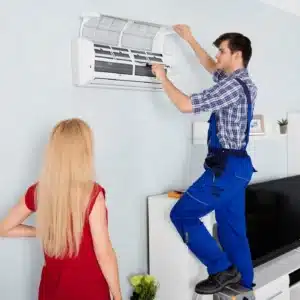Importance of HVAC Maintenance for Commercial Buildings
In Florida’s hot and humid climate, HVAC systems are essential...
Popular alternatives to conventional heating and cooling systems include water source heat pumps. They are significantly more effective and economical since they conduct heat exchange using water rather than air. Commercial water source heat pumps are growing in popularity, particularly for their capacity to offer heating and cooling solutions for sizable buildings like businesses, hotels, hospitals, and schools.
Water serves as the heat exchange medium in water source heat pumps. The system employs heat extracted from a water source, like a lake, river, or well, to warm up a building. The process is reversed in the summer when the heat pump pulls heat from the structure and releases it into the water source. This is called a water-to-water heat pump.
A ground loop can also be used as a heat exchanger in some water source heat pumps. In this instance, pipes are buried in the ground, and to draw heat from the earth, a fluid is circulated through the pipes. This is known as a ground source heat pump or geothermal heat pump.
A refrigerant is heated by the heat pump as it is transferred from the water or ground to a closed-loop system. The heat from the water or the earth is absorbed by the refrigerant before it travels via a compressor, where it is squeezed, and the temperature rises. After passing via a heat exchanger, where heat is released into the building’s air or water supply, the hot, compressed refrigerant continues its journey.
Commercial water source heat pumps are superior to conventional heating and cooling systems in many ways. They are a wise investment for companies for the following reasons:
Energy Efficiency: Traditional heating and cooling systems are substantially less energy-efficient than water source heat pumps. They consume a tiny fraction of the energy needed by conventional systems, which can help organizations avoid yearly energy expenses of thousands of dollars.
Low Maintenance: Commercial water source heat pumps are long-lasting and require little maintenance. Since they require less upkeep than conventional systems, this can help organizations save even more on maintenance and repair expenses.
Cost-Effective: Commercial water source heat pumps cost more upfront than conventional systems, but they have a considerably better rate of return. Businesses can quickly recover their initial investment because of the reduced maintenance expenses and energy savings.
Environmentally Friendly: Commercial water source heat pumps are more carbon-efficient than conventional systems and are therefore more environmentally beneficial. They are a great option for companies committed to sustainability because they utilize renewable energy sources and emit zero emissions.
Versatility: Water source heat pumps are a flexible option for businesses because they may offer both heating and cooling solutions. They can be employed in a range of locations, including major business buildings, hospitals, and educational institutions.
Commercial water source heat pumps are a great investment for companies trying to cut costs, lessen their environmental impact, and boost energy efficiency. In comparison to conventional heating and cooling systems, they have several advantages, such as reduced maintenance requirements, cost efficiency, and versatility. If you are interested in this solution, Kyzar Air Conditioning offers expert water source heat pump solutions tailored to your business needs.
With many years of experience in the business, we offer fast, reliable, and cost-effective services in Palm Beach and Martin County, Florida.
Call 561-640-1000 for more information.
Disclaimer: All content on this website is intended for informational purposes only. We discourage anyone from attempting to repair, replace, or maintain HVAC systems without the help of a licensed, insured HVAC technician.

In Florida’s hot and humid climate, HVAC systems are essential...

Florida’s warm climate brings many advantages, but it also means...

When it comes to keeping your home comfortable in Florida’s...

In Florida’s hot and humid climate, a reliable air conditioning...

If your air conditioner has been chugging along since the...

Indoor air quality is a big deal, especially in commercial...